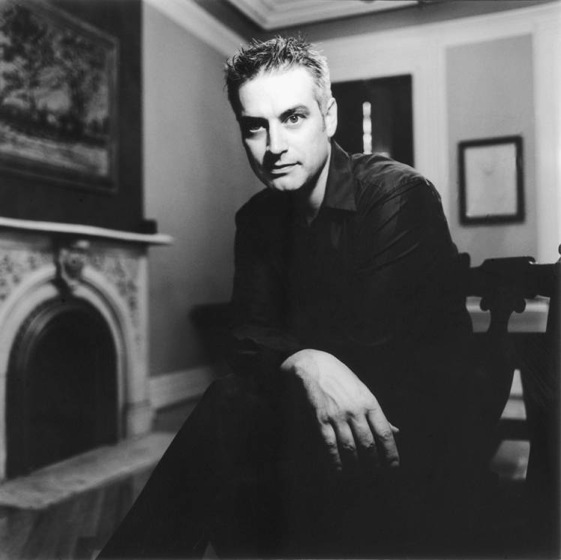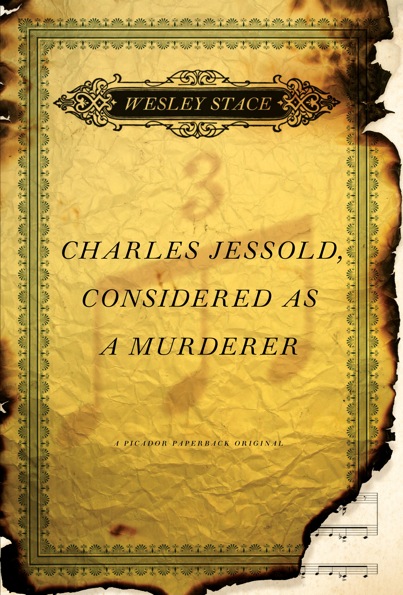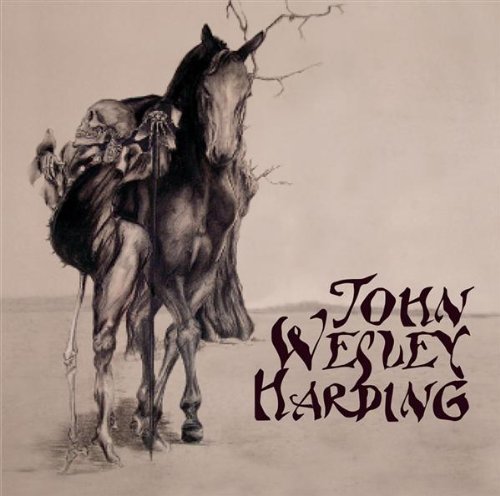Wesley Stace's eclectic talents make him a hard man to pin down. For over 20 years he's recorded highly literate folk music under the name John Wesley Harding. He also oversees The Cabinet of Wonders, a downtown variety show featuring a roster of accomplished musicians, writers, comedians, and the odd ventriloquist. At a given show you might see John Hodgman or Kristen Hirsh, Rick Moody or Eugene Mirman.
The literate quality to Stace's lyrics and interests is no accident. He's now written his third novel, Charles Jessold, Considered as a Murderer. This is no minor musing, but a fully realized historical novel, knowing and classical, wry and affecting.
Stace, studied at Cambridge, lived in New York for the past 20 years, and recently moved to Philadelphia. He's a welcome reminder that wide-ranging achievement is never accidental.
We spoke recently in Manhattan.

The man in full. Photo: Lizzie Himmel.
Your book deals with music, particularly English folk songs. Did the idea of the novel come from a desire to write about that tradition?
The idea for the book came from a few places. One was Werner Herzog's movie Death For Five Voices about Gesualdo. I love Herzog, but with his feverish documentary style you can't tell what's real and what isn't. I needed to check out what was true because it was so inspiring. Then I read one of the volumes of Taruskin's biography of Stravinsky, and realized how codependent Stravinksy was with his critics, and how he wrote to please them. Not just because he wanted good reviews, but because he wanted to have them shape his career, and he wanted to shape their writing about him. From there I moved to nationalist music, and the nationalist music cause at a time in England when they wanted music to be less German and wanted to find a more English identity. That often happens when barriers are eroded or wars are beginning. And then that brought me back to the folk music that I like.
How much does your experience as a musician play into that?
One of the reasons I chose to set the novel not in my world of music, was so I could write more purely about music and its creation, without having to constantly be hijacked by the need to be satirical toward the world I know about. In fact, the next novel will be set in a much more familiar contemporary musical world.
Do you like trying to keep that distance?
I liked it for this book. That's the nice thing about setting it in the past, you're freed from having to talk about contemporary things--well you are talking about contemporary things, you are talking about today. Sci-fi is set in the future but it's always about today, and historical fiction is set in the past but it's always about today. I tried to divorce myself about music and making music, except inasmuch as I am a composer of songs, and I know how biographical criticism can lead you up the garden path.
You see this over and over again in rock music. 'Oh, Bob Dylan had that heart attack-y fungal thing, and then his new album came out and it's all about death,' and it's just these neat little things. 'Bob Dylan was getting divorced, and then he brought out Blood on the Tracks.' It just doesn't work like that. It's all very teleological. You can see in Jimi Hendrix, his entire oeuvre, his death, because that's the narrative. So I thought of my guy as that kind of character, Jessold, that's why it's called Charles Jessold, Considered as a Murderer. If he's considered as a murderer, it's one book, and if he's considered another way, not as a murderer, it's a whole other book. This book allows you to do both. It's because like any classic novel, where there are events seen from more than one point of view, the events appear very different.

It's interesting that a figure like Bob Dylan, who lived decades after the time of the novel, can inform the debates around your characters.
It's true. I do think of Jessold in a certain way, they're things that happened to Bob Dylan, when he was a young folkie and then he rejected protest music, and everybody booed. I think of Jessold like that, and I think of Shepherd, the critic, very much like the people who booed. Because Jessold, as Bob Dylan, used protest and the folk movement to springboard to the wider musical expression that actually made him really famous. He would still be famous if he'd just written "Blowin' in the Wind," but if he'd stayed in that world he'd be Tom Paxton, or Tom Rush, rather than the monolithic figure that we know. So it was very useful to me to think of Jessold as a Dylan-y figure, rejecting the path he was supposed to go down, and moving towards his own expression, which is when his genius clicks in.
It's easy to think of classical forms of music, particularly opera, in historical terms. So it's fascinating reading about the preparation of the opera in the book, what's at stake, decisions about set designed, the reactions of the audience. It feels very urgent and fresh. Which is the way, of course, music has always been.
Absolutely. A book like Alex Ross's The Rest In Noise, or Electric Eden: Unearthing Britain's Visionary Music, see music as a continuum. Alex Ross set himself the parameters of Strauss to The Beatles. Electric Eden, a British book, goes from the folk movement to Kate Bush and Talk Talk, because it's about this strand of English, twentieth century visionary music--where it's from, why people were interested in it, why they made it. I love things that mix up those things. I couldn't do it in my book, because pop music just isn't around, I did like the idea of putting in some of those debates--like the Bob Dylan debate--into this setting.
Like Schoenberg.
Exactly.
You're very interested in different types of performance. In your Cabinet of Wonders you deal with all sorts of theatrical presentation.
It's true. 'Curating' is a big word nowadays, you could say 'throwing things together' and I really like throwing things together, or curating, and seeing what sticks.
I was in plays at school, that's it. But opera is a world I feel very comfortable in, and I think the extravagant exaggeration of emotions and gesture are quite good for helping me realize what's happening. It's almost like when you see Noh theater you can understand it anywhere around the world. I'm from quite an extravagant family, emotionally, which may sound like we're all insane. We're not. Just a generous and expansive family, a hyperbolic family. One of my sisters is an opera singer in Italy at the moment, my other sister is in a circus show in Vienna. My grandfather did a bit of conjuring.
A bit of conjuring?
He was a conjurer. He died when my mum was eleven, so I never met him. But his is the ventriloquist dummy that was on the cover of my book, By George. And the ventriloquist dummy's called George, that's where that came from.

Writing historical fiction takes a lot of research--some of which you use and a lot of which you don't.
Exactly. A trick to novel writing that I had to learn, and something I'm sure your friend William Boyd would say, is to do all the work in the research, and then never mention any of it. Because all the thoughts you've had on that subject will come through with just one little turn of phrase and that's all the knowledge you need the reader to know. I did a lot of reading about things like women's clubs in London, and none of it's really in there. But it is fascinating, women really did have quite separate lives then, and were able to entertain themselves--I mean upper class women--entertain themselves in fully autonomous ways.
You've written historical novels in the past, do you like entering a new era with each book, learning about something that leads you to something else, like, women's clubs?
It totally makes me click. It's like you can do all the research, but then you somehow hit upon a book that's the exact one you want, that all the other ones were just leading you towards. There was an amazing book called Uncommon Arrangements by Katie Roiphe, about weird marriages in the 1900s, like HG Wells and Rebecca West, and that was just a great book for me to read. Because I often find that the little things that one worries about in a novel, and thinks will this be believable, or could this possibly happen, the audience can take way more than that. That's nothing to an audience. There are weirder things happening in people's lives on a daily basis.
When you're doing this research to flesh out the background, where is the plot in your mind? Does the research inform the plot?
You totally let it affect you. I think apart from anything else, I believe if your characters are good they just start to do things that that character would do. If you make up a character, you can only have made up so much about them before you begin, but once you start to write, and give them dialogue, once that character then comes with a situation, it's not the person you've originally thought of, it's this person who you've now got, and they've said certain things, and they've done certain things, and they would do a certain thing at that point.
But I couldn't have told you that at the beginning of the book, when things happen in the novel, things start to change. Likewise, when you're doing a bit of research, or when you're reading a good book on salons in England in the early twentieth century, you know you read some little detail and you're think, I've got to get that in there. It has the ring of like, you couldn't have made that up, that's too good to be true. Like when I read about the servants ironing the newspapers in the country houses, I used it in Misfortune, and then I saw Downton Abbey, and they iron the newspapers and I thought they read the same thing I read, because it's too good.
It's interesting how we impose what we know about you onto the book, even when we're trying not to: your different identities, you're English, you're a musician. All of these things are in play.
I think you're right. There are things in the book that happened to me. I think the business of creation is, in the end, pretty haphazard. However neat people's books are, there are so many things that just happen. People are always asking about John Wesley Harding, like I picked that name after years of debate. Whole lives are spent making up for things that are decided in ten seconds after too many drinks.
Isn't it true that when you chose the name John Wesley Harding you didn't necessarily think you would be, I won't say stuck with it...
No no, stuck with it is quite fair. If somebody had said 'Do you want to be called John Wesley Harding making music in twenty-one years, or would you like to be Wesley Stace?' I know I'd have answered Wesley Stace. Which is why it was quite a pleasure really, to have the possibility of an alternative career. I did feel like I should put my name on those books. I hope that the books would bring people to my music, and, in fact, I think that's happened.
You lived in New York and now in Philadelphia, but the book is set in London and the English countryside. Do you miss England?
Well my narrator hates the landscape, he's marooned there. It's totally set where I'm from. That house, that view is the view from my mum's sitting room. The places in Rye like the cottage they have, that wasn't really anywhere in particular, but I know a million places like it. Is there an element of homesickness to writing there? I can answer that, and it's yes. I think there's an imaginative space to be filled, like a blank canvas, it ends up being somewhere in England. It's not like I don't go to England enough, but I've lived here twenty-one years, and that's a long wait. That's nearly half my life I haven't been in Britain, and I feel very British.